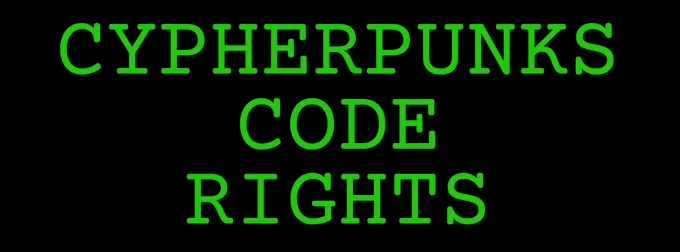
The Bill of Rights in the U.S. Constitution was meant to enshrine freedom.
Spooner expressed this sentiment following the Civil War – how much more true is it now?
In the 21st century, free speech is curtailed. Privacy is dead. The right to transact is conditional, subject to support of the current regime.
In today’s age of lawfare and capricious regulation by unelected bureaucrats, that rule of law is a meme is becoming self-evident.
A document alone cannot protect human liberty. It never could. Only systems that make oppression too expensive can do that.
Freedom Is Not Given, It Is Coded
Spooner and Thoreau understood what most refuse to accept: rights do not exist unless they are enforced.
For centuries, enforcement meant violence. Judges interpret legal code. The state enforces it at gunpoint. Laws are upheld by force.
Crypto changes everything. In decentralized systems, code is law – not as a metaphor, but as reality. Smart contracts are not interpreted by courts. They execute autonomously. And unlike legal systems, they cannot be coerced or threatened.
For the first time in history, economic incentives replace violence as the primary enforcement mechanism.
The Economics of Enforcement
The 2nd Amendment itself is instructive of effective resistance.
In the United States, there are more guns than people. Attempts to confiscate them would be quickly met with overwhelming resistance.
So, the US remains – on the whole – one of the most free countries in an age where dying empires are oppressing their citizens en masse. And the takeaway is this – the 2nd Amendment doesn’t protect the right to bear arms – the arms do.
By raising the cost of enforcement prohibitively, freedom is secured.
This is how the world changes – not by asking for permission, but by making control economically infeasible.
Corporate Insurgency
We’ve watched this strategy succeed time and again for over 30 years on the internet.
In 1999, Napster cracked open the music industry’s monopoly, but it was centralized – and so was shut down.
But BitTorrent – now a crypto protocol – made enforcement so expensive that shutting down file-sharing became impossible.
File-sharing through torrents became so popular that the music industry, formerly dominated by extractive business models like iTunes’s – charging pre-teens $0.99 a song – collapsed as demand dried up in favor of the costless data replication that they called “piracy.”
Taking the view of Napster as a missionary, not mercenary organization, Napster won. Today, streaming services like Spotify and Pandora dominate as the leading business model in the music industry.
This taught us an important lesson: decentralization wins when it makes enforcement too expensive to succeed.
Crypto + Uber: Allies
We’ve see this approach succeed in startups as well. Legal scholar Elizabeth Polman calls this form of corporate civil disobedience “regulatory entrepreneurship,” citing Uber as a prominent success case.
Uber ignored outdated taxi laws which granted taxi organizations a monopoly on on-demand transportation in a given area. Rather than trying to uproot the entrenched bureaucracy through persuasion and asking permission, Uber expanded so quickly and amassed so much influence that regulators had no choice but to concede.
Likewise we’ve seen the strategy work in crypto. For a long time, prediction markets were extremely tightly controlled, as governments do not want to see these applications succeed. Polymarket broke the state’s control. Now, prediction markets are poised to upend governance – first in web3, and soon, in nation states.
The first crypto wars were fittingly won in the United States. Phil Zimmerman’s case for PGP turned cryptography into free speech. The U.S. government tried to classify strong encryption as a munition, illegal to export. Zimmermann published the code anyway, winning the first Crypto Wars and proving that releasing powerful code can change history.
But it wasn’t the court’s decision that won the freedom – the crypto cat was out of the bag, rendering enforcement moot.
Cryptoeconomic Authority
These are not isolated events. They are proof that when technology forces a shift in enforcement costs, (as James Dale Davidson predicted in 1995 with The Sovereign Individual), the old order collapses.
Satoshi understood this well; Bitcoin follows the same principle. Bitcoin is not secured by law – it’s secured by economic incentives.
Attacking Bitcoin is financial suicide. The incentives are aligned so that miners, even those who would prefer to subvert it, have only one rational choice: defend the system, because it pays more than breaking it.
”[A would-be attacker] ought to find it more profitable to play by the rules, such rules that favor him with more new coins than everyone else combined, than to undermine the system and the validity of his own wealth.”
— Satoshi Nakamoto, Bitcoin: A Peer-to-Peer Electronic Cash System
This is cryptoeconomic security: the fundamental principle that a system remains intact only if attacking it is more expensive than cooperating with it.
The first Crypto Wars were won when Zimmermann ignored an unjust law and published PGP, giving the world encryption too powerful to ban. The next wars will be won the same way: by deploying unstoppable crypto protocols that make financial surveillance and censorship obsolete.
Cypherpunks Code Rights

Cypherpunks have a singular opportunity to enshrine human rights into unstoppable, economically self-enforcing systems. But rights are not real unless they are secured.
Legal systems are enforced through coercion, often arbitrarily.
Crypto systems are absolute, enforced through incentives.
That is the future. But only if we build it correctly.
Conclusion
Freedom is not granted. It is taken. It is coded. And it is defended by those who understand what’s coming.
At Token Dynamics, we design and assess cryptoeconomic systems with precision, ensuring that the cost-to-attack is astronomical, and making participation irresistibly profitable. This is how you secure a protocol. This is how you enshrine rights in code.
If you’d like our help with yours, reach out to @tokendynamics or message me directly.
Let’s build for the next century, not just the next cycle.
